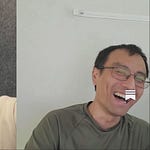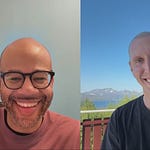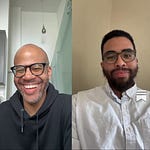be
→ joke that you're a recovering content creator (but actually mean it)
→ survive five years at BuzzFeed, creating 12 videos monthly
→ get hospitalized from stress chasing million-view metrics
→ experience three layoffs in three years and let depression win for 18 months
→ start creating anonymously when your wife says "just make something"
→ post four times daily until preciousness dies
→ discover creativity is about permission, not talent
→ build a community of 170,000+ by being vulnerable, not viral
→ wake at 5 AM to write before the world demands performance
→ work on the same screenplay for 10 years while finishing a book in months
→ predict Avengers 11 will be AI-generated (and be okay with it)
→ understand AI creates genres, not extinctions
→ avoid consuming content similar to what you create → remember: Create isn't hard. Repeat is.
Thanks for joining our live conversation, Zach. Your honesty about the dark side of viral content creation was fantastic, my friend.
Key reminder:
Get off the Viral Metrics Treadmill
Zach's BuzzFeed education taught him the science of virality—but the cost was his mental health and creative soul. The million-view benchmark became a prison. Every Monday morning brought panic attacks about what video to make that day.
The breakthrough? Volume defeats perfectionism.
"The more you create, the less precious you get about things."
This isn't hustle culture repackaged. It's the opposite. By posting frequently (initially 4x daily), Zach broke his attachment to individual pieces. No single creation carried the weight of his worth.
The Permission Framework
We spent significant time on Zach's core insight: creativity is fundamentally about permission.
"It's permission, allowing yourself to be creative, allowing yourself to take a risk, allowing yourself to think in a different way. That's all it is."
This reframes the entire creative conversation. Not "how do I get talented enough?" but "how do I feel safe enough?"
The AI Genre Theory
Unlike the doom-and-gloom crowd, Zach sees AI through a historical lens. He compared our moment to the 2007 writers' strike that accidentally birthed reality TV's dominance.
"Did it take away scripted content? No, there's now just a genre that's equally as big."
His take on executives trying to prompt AI was brutal: "You need something called taste. If you can't explain what you want to a human, you're sure as heck not going to be able to do it to an algorithm."
The Analog Resurgence Pattern
Zach noticed something crucial: as iPhone cameras perfected photography, film cameras surged in popularity. As Spotify dominated, vinyl sales peaked.
"We want the imperfection. We're not going to take 30 pictures. We just want the one picture and you get what you get."
When AI can generate perfect content instantly, human imperfection becomes premium.
I'm still processing his admission about the 10-year screenplay he can't finish because it's his "magnum opus," while he breezed through writing a book because it wasn't his first love.
There's a lesson there about how preciousness kills more dreams than failure ever could.
Zach's new book, "Create Repeat: 365 Days of Creativity," launches with Penguin Random House in November. But honestly, the book feels like a natural extension of what he's already doing—allowing people to get started.
The irony isn't lost on me: the guy who mastered viral content now measures success by how many people he helps escape that same treadmill.
- John











